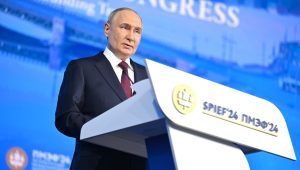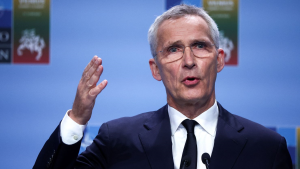Breaking: Putin Unveils Shocking New Nuclear Weapon Rules, Global Security at Risk
In a move that has sent shockwaves through the international community, Russian President Vladimir Putin has proposed new rules for the use of nuclear weapons. The announcement, made on Thursday, suggests a significant shift in Russia’s nuclear doctrine, potentially lowering the threshold for nuclear deployment.

Putin’s proposal outlines several key changes to Russia’s nuclear policy. The most striking alteration is the suggestion that Russia could use nuclear weapons in response to non-nuclear attacks on Russian territory. This marks a departure from the previous stance, which limited nuclear use to scenarios where Russia’s existence was threatened.
The Russian leader emphasized that the new rules aim to strengthen national security. “These changes reflect the evolving nature of global threats,” Putin stated during a televised address. “We must adapt our defense strategies accordingly.”
Key Points of the Proposed Changes
Under the new guidelines, Russia could potentially use nuclear weapons in the following situations:
- In response to conventional attacks on Russian soil
- To defend against aggression using weapons of mass destruction
- When faced with critical threats to Russia’s strategic facilities
Putin stressed that these measures are purely defensive. However, critics argue that the broadened criteria for nuclear use could escalate tensions and increase the risk of nuclear conflict.
International Reaction
The announcement has sparked concern among world leaders and defense experts. NATO Secretary-General Jens Stoltenberg called the proposal “deeply troubling” and urged Russia to reconsider its position.
“This move could destabilize the delicate balance of nuclear deterrence,” Stoltenberg warned. “It’s crucial that all nations work towards reducing, not expanding, the role of nuclear weapons in global security.”

The United States has also expressed alarm at the proposed changes. U.S. Secretary of State Antony Blinken stated, “We are closely monitoring this situation. Any lowering of the nuclear threshold is a dangerous step backwards for global security.”
Implications for Global Security
Defense analysts are divided on the potential impact of Russia’s new nuclear doctrine. Some experts believe it could lead to a new arms race, while others see it as a strategic bluff aimed at deterring Western intervention in regions of Russian interest.
Dr. Elena Volkova, a nuclear policy expert at Moscow State University, offers insight: “This move signals Russia’s determination to assert its power on the global stage. However, it also raises the stakes in international conflicts, potentially making diplomatic solutions more challenging.”
The proposal comes amid ongoing tensions between Russia and the West, particularly over conflicts in Ukraine and Syria. Some observers speculate that the timing of the announcement is linked to these geopolitical tensions.
Historical Context
Russia’s nuclear doctrine has evolved significantly since the end of the Cold War. The country reduced its nuclear arsenal in the 1990s but has since modernized its nuclear capabilities under Putin’s leadership.
This latest proposal represents the most significant shift in Russian nuclear policy in decades. It echoes elements of the Soviet Union’s nuclear stance during the height of the Cold War, raising concerns about a potential return to that era’s tensions.
Next Steps
The proposed changes to Russia’s nuclear doctrine will need to go through a formal approval process. This includes review by the Russian parliament and final sign-off by President Putin.
International bodies, including the United Nations Security Council, are expected to discuss the implications of Russia’s new stance in the coming weeks. Diplomatic efforts to address concerns and potentially negotiate adjustments to the proposal are likely to intensify.
As the world grapples with this development, the global community faces a critical juncture in nuclear policy. The coming months will be crucial in determining whether this move leads to increased tensions or serves as a catalyst for renewed disarmament talks.
The stakes are high, and the eyes of the world remain fixed on Russia’s next moves in this high-stakes game of nuclear strategy.

